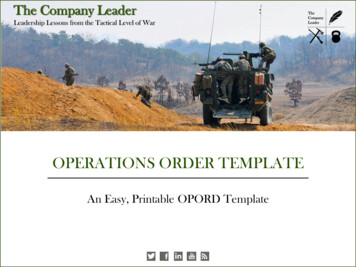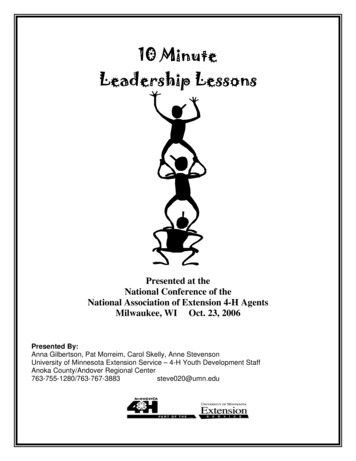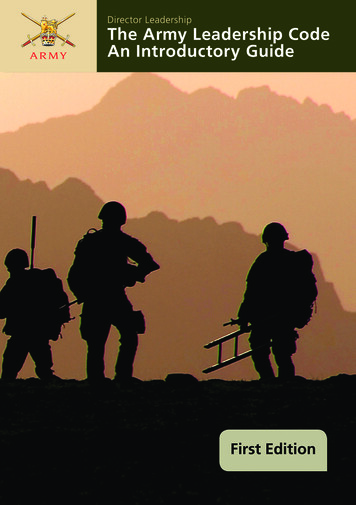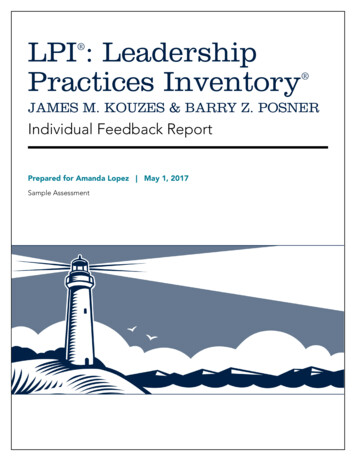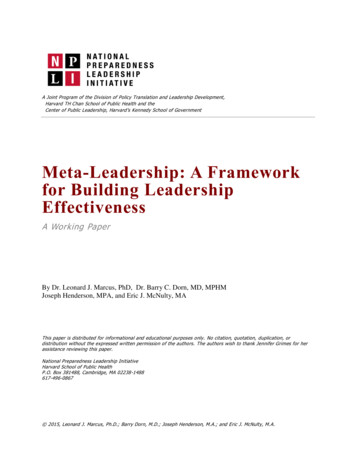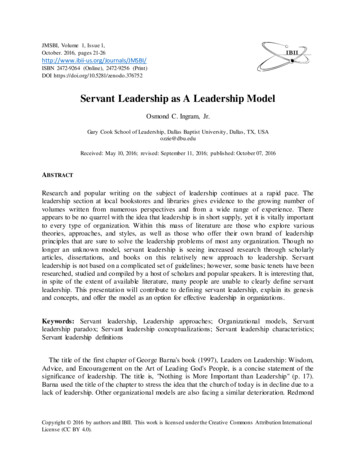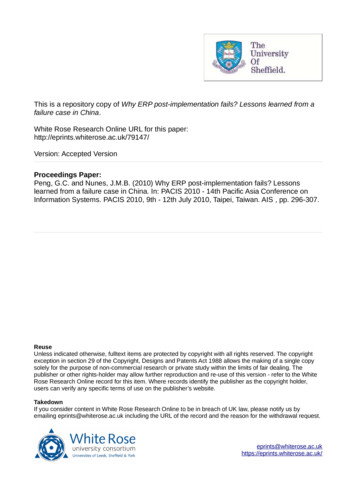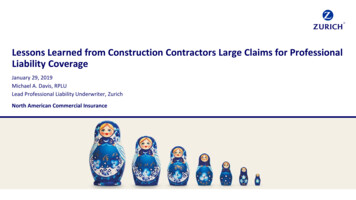
Transcription
Principles of Leadership:Lessons from the Life of Nehemiah Lee Carl FinleyApril 2000Magnolia, Ohio
ContentsIntro““123Introduction 1Introduction 2Introduction 3II Kings 17II Kings 23.15-20; 25.1-30Ezra ehemiah 1.1Nehemiah 1.2-4Nehemiah 1.4b-11Nehemiah 2.1-10Nehemiah 2.11-20Nehemiah 4.1-23Nehemiah 5.1-13Nehemiah 5.14-19Nehemiah 6.1-19Nehemiah 6.15-7.5; 7.63-65Nehemiah 8.1-8Nehemiah 8.9-12Nehemiah 8.13-18Nehemiah Ch. 9Nehemiah Ch. 10Nehemiah Ch. 11-12Nehemiah 13.1-9Nehemiah 13.10-14Nehemiah 13.15-22Nehemiah 13.23-31p. 3p. 7p. 11p. 14p. 18p. 22p. 24p. 28p. 31p. 34p. 37p. 39p. 42p. 46p. 49p. 52p. 54p. 56p. 58p. 61p. 64p. 68p. 72Acknowledgments and Intellectual OwnershipI thank my loving and patient wife, Jennifer, who was of infinite support throughout the course of this study. I thank my Sovereign andGracious God, who has given me grace form eternity past, the desire to know and study His word, and mercy to accomplish this small work.My Lord, I am deeply grateful to you.Provided that no profit is made from the sale of any copies, individual copies may be made for personal and/or ecclesiastical purposes only,provided the copies are of the work in full, and that no part of this work is omitted. Aside from this, this document is not to be reproducedmanually, electronically, or in any other form, nor are these copies to be sold in any form for profit.About the AuthorLee Carl Finley was raised in East Sparta, Ohio, USA. He graduated Summa Cum Laude from Ohio University (March 1984) with a Bachelor’sof Science Degree, specialising in Cartography. He graduated Cum Laude from Northwest Baptist Seminary (May 1990) with a Master ofDivinity Degree. From 1994-1999, he laboured in a (now failed, as of 10/99) church-planting work in Waynesburg, OH. He subsequentlyearned his Doctor of Philosophy (PhD) in Aramaic in Scripture from Reformation International Theological Seminary in 2012. Lee is presentlythe Director of Environmental Health for a small city health department in East-Central Ohio.-----------“What any man undertakes to prove as necessary, he shall make good out of the scriptures”--the primary rule of the Westminster Divines
03.16.97Introduction 1Background ConsiderationsPrinciples of Leadership:Lessons from the life of NehemiahII Kings 17Background I:The deportation of Northern Israeland the settlement of SamariaFor the next several weeks we will be examining the life of Nehemiah, from the bookof Nehemiah. To better understand the context of this book that bears his name, it ishelpful if a person has a grasp of the events in the life of Israel that preceded theexile. We will begin this study by examining two passages relevant to thisbackground material: II Kings 17 and II Chron. 36. This week we will begin with IIKings 17.* read II Kings 17 *I. Historical/Exegetical OverviewWe will begin our study of this passage with an historical overview of the eventsmentioned in II Kings 17. We will then discuss four different sets of observationsdrawn from this text, that forms the background for the book of Nehemiah.The chapter can be divided into five sections for ease of consideration:vv. 1-7 Hoshea and the siege of Samariavv. 8-18sins of the Northern Kingdomvv. 19-20 sins of the Southern Kingdomvv. 21-23 sin of Jeroboam, Son of Nebatvv. 24-41 the “New” Northern Kingdomvv. 1-7 Hoshea and the siege of SamariaChapter 17 begins with the last king of the Northern Kingdom: Hoshea. As the textstates, he did evil in the sight of the LORD, but not as the kings of Israel before him(v. 2). At this time, the deportation of Israel had already begun (cf. II Kings 16. 2730) and the Northern Kingdom of Israel was (to some degree) a vassal or slave stateto Assyria, the great world power to the north.Hoshea conspired against the King of Assyria (v. 4). Soon thereafter, the entirenorthern kingdom was exiled to Assyrian-controlled lands.
vv. 8-18 sins of the Northern KingdomVerses 8-18 are a summary. Most of the books of I-II Kings is found in narrative. Invv. 8-18 we have the author’s own interpretation of this narrative he has beenwriting. The Northern Kingdom of Israel sinned from its inception, and continuedthroughout its history. It is interesting to note that of all the kings that had ruledover the nation of Samaria (ie--the Northern Kingdom), not one of them waspleasing in the eyes of the LORD. The people sinned in their worship (vv. 9-14)--theyserved idols throughout the course of their history. They sinned by rejecting thestatutes and ordinances of the LORD (vv. 15-18) and continued in the ways of thenations.vv. 19-20 sins of the Southern KingdomVerses 19-20 only briefly mention the sins of the Southern Kingdom of Judah. Theinfluence of Samaria had affected the Southern Kingdom as well.vv. 21-23 sin of Jeroboam, Son of NebatThe sin of Jeroboam, Son of Nebat is seen as the “seed sin” for this nation. It wasthe sin of Jeroboam in which Samaria (the Northern Kingdom) walked throughouttheir entire existence (v. 22). In a few moments we will discuss this individual.vv. 24-41 the “New” Northern KingdomThe remainder of the chapter speaks of the new inhabitants of the northern part ofthe promised land. At this time, it was the habit of Assyria deport peoples and movethem great distances, placing them in unfamiliar surroundings, both geographicaland cultural. In this scenario, a “troublesome” people could be destroyed from with,through intermarriage and through cultural assimilation into a new setting. After ageneration or two, the peoples would no longer be separate nations, but aheterogeneous mixture of peoples. And hopefully, nationalistic fervour would be athing of the past.These verses are the most important for our study of the life of Nehemiah, for theyexplain from where the enemies of Nehemiah came.Verses 24-28 speak of the new inhabitants and their subsequent problems in theland of Israel. It concludes with a priest being brought in to teach the people to“fear” the LORD.Verses 29-33 are a brief discussion concerning the gods these displaced peoples“brought” with them. Note v. 33.Verses 34-41 discuss their relationship to the law of God. Even though they “feared”the LORD, they did not fear the LORD. They may have went through the motions ofworship to the God of Israel, but they continued to worship their idols. In fact, theirworship of the LORD was most likely false. Note that it was Josiah, King of Judah,who would come into this land several years later and finally destroy the alter atBethel, that Jeroboam, the Son of Nebat, had built (cf. II Kings 22). Clearly, theirworship of the LORD was not something that was pleasing in the eyes of Josiah (andultimately the LORD Himself).
II. ObservationsIn considering this passage, we are endeavouring to have a better understanding ofthe context in which Nehemiah was living and functioning. The title of our study is“Principles of Leadership: Lessons from the Life of Nehemiah”. Although we have notyet begun to study the book of Nehemiah of the life of this man, this passage doesillustrate many observations regarding leadership, sin and God that would beprofitable for one to consider.IIa. Observations regarding SinThe first group of observations we will consider are those dealing with sin. If thispassage speaks of anything, it is sin--the sin of Hoshea, the sins of the Israelites andof Judah, the sin of Jeroboam the Son of Nebat, the sins of those exiles brought intothe land of Palistine. Sin is a common thread running throughout this chapter.1. In all areas of life, one will be affected by the sins of othersIsrael was affected by the former residents of the land of Canaan (v. 8) and by thesin of Jeroboam the son of Nebat (vv. 21-23). Judah was affected by the sins ofIsrael (v. 19). The new inhabitants of the land were affected by the “priest”. Andlater, Nehemiah had to prepare for attacks from the descendants of these same idolworshiping men and women.2. Note carefully the legacy that sin may haveThis is true of the person of Jeroboam the Son of Nebat. His name is synonymouswith sin and disobedience. Adam is another whose legacy is one of sin.Behold, the legacy of sin:--persistent--influential--indelible3. Sin is often secretcf. v. 9. Note also Achan, Annanias and Sapphira. their sins were also secret, at leastfor a time.4. sin can often be religiouscf. vv. 10, 33. This sin may take many forms. But even though these actions mayhave been religious, they were still sin.5. Doing that which the world does is seldom, if ever, pleasing to Godcf. v. 11
6. The sin of one man may affect manycf. v. 21. Note how many lives were affected by the sin of one man--Jeroboam theSon of Nebat. His was a legacy that spread several hundred years, until thedeportation of the Northern Kingdom.The same truth can be seen throughout the course of history: note how our liveshave been affected by men such as Darwin, Scoffield, Finney, Joseph Smith. Each ofthese men died almost 200 years ago, but their legacy is alive and well all over theglobe.7. Sin will be punishedcf v. 23. Note also, however, that a leader may have to be dealing with the effects ofsin prior to God’s divine judgment upon it. Various kings of the Southern Kingdomhad to contend with the sin of the Northern Kingdom and its kings.8. Sincerity means nothing; holiness, righteous and obedience mean everythingcf. vv. 11, 18, 20, 23, 34, 40-41 True religion has obedience; false religion mayhave many forms, but no true, evangelical, gospel obedience (cf the Pharisees ofJesus’ day).IIb. Observations regarding God1. The LORD punishes sin.cf. vv. 8, 11, 22-232. The LORD is a patient God--both with the obedient and the disobedient.3. God will be worshiped as He prescribescf. vv. 9-12, 16, 40-41IIc. Observations on Leadership1. A leader may experience the cumulative punishment of generationscf. v. 2 with v. 6ff and v. 182. The actions of one man may affect manycf. vv. 21-23IId. Miscellaneous Observations1. Being in a “blessed” place does not make one blessedcf. v. 24 Even though they dwelt in the promised land, they were not blessedbecause of this fact.
03.23.97Introduction 2Background Considerations IIPrinciples of Leadership:Lessons from the life of NehemiahII Kings 23.15-20; 25.1-30Background II:The reforms of Josiah/the siege and destruction of JerusalemI. The reforms of JosiahBefore we begin with the body of our lesson tonight, I think it would be good toexamine briefly one other episode that transpires in the cities of Bethel and Samaria(both of which were in the Northern Kingdom). Last week we saw that a “priest” wasbrought back from the exile to teach the new inhabitants of the land regarding the“God of the land”. At this time he went to Bethel, both to live and work.Also, last week, we saw that the new inhabitants of the Northern Kingdom wereutilising the old high places that the Northern Kingdom of Israel had used prior totheir deportation. In chapter 23 of II Kings we learn that this practice of using theold alters, and the practices introduced by this “priest” were abruptly halted byJosiah, King of Judah.* read II Kings 23.15-30 *From this passage, it can be seen that Josiah’s zeal for God spilled over into whatwas now an overtly pagan land. The ancestors of the Samaritans now lived in thisland, and were worshiping their gods, along with some adulterated form of theworship of the God of Israel. As it relates to our study of Nehemiah, this episode mayprovide us with a bit more understanding of the animosity that these new inhabitantsmay have had for the Jewish people who returned from the exile. Undoubtedly, theancestors of these “Samaritans” in Nehemiah’s time were affected greatly by thedeeds of Josiah in at east two ways:1. the destruction of the high place at Bethel. The high place at Bethel was centuriesold at the time of its destruction by Josiah. Undoubtedly, this was one of the moresignificant and prominent places of worship in the new Samaria, as it had been in thelife of the Northern Kingdom of Israel. Now, a center of commerce and worship wasdestroyed by Josiah.2. the destruction of the rest of the high places and the slaughter of their priests. Notonly was a prominent place of worship destroyed by this Judean King, but all of thesecondary places of worship were destroyed as well. In our day and age, it is hard tocomprehend how devastating this act was. Religion was at the center of many
ancient societies. In fact, one of the fist things that these displaced peoples did uponentering into the land of Israel was to set up idols and high places. Josiah destroyedthe life of many of these new communities, tearing down their high places.In addition, he slaughtered many priests who served at these sites. Most likely, someof the descendants in the land at the time of Nehemiah’s return were descendants ofthose slaughtered by Josiah, the ancestor of Zerubbabel, who led an exodus of Jewsback to the land of Judah.These, then, in brief, are the deeds of Josiah, king of Judah against the people whoinhabited the Northern Kingdom, after the exile.Before we leave Josiah, I would like to make one observation regarding hisleadership, namely, that biblical Christian leadership will be hated by the enemies ofGod. Undoubtedly, the new Samaritan peoples were not thrilled with Josiah’s godlyleadership or his godly deeds. His leadership lead to the destruction of much of whatthey held dear, to the death of many people the had honoured. Clearly, unless theLord graciously gave them repentance, they would have hated Josiah for what hehad done. Thus, I observe, that biblical Christian leadership will be hated by theenemies of God.II. The Siege and Destruction of JerusalemAs we move on in our study, please turn to II Kings 25.1-30. This chapter recountsfor us the siege and destruction of Jerusalem. Verses 1-3 recount the siege itself Nebuchadnezzar sent his army to lay siege to Jerusalem, and began building a siegewall against the city. For three years the city was under siege.Verses 4-7 recount the fall of Jerusalem. In the midst of the final hours of Jerusalem,the king and many of his chief officers flee the city. It would appear in v. 5 that someof may have escaped at this time. However, the king and his sons were captured,and his sons were killed (v. 7) and Zedekiah, King of Judah, was blinded and taken toBabylon.Verses 8-21 recount for us the subsequent actions of the Babylonian Army againstJudah and Jerusalem. In vv. 9-10 the city is burnt, the temple and palace destroyedand the wall of Jerusalem torn down. It would appear from v. 11 that the vastmajority of the people of Jerusalem are exiled at this time, with only the poorestremaining in the land. Verses 13-17 recount in more detail the destruction of thetemple. Verses 18-21 concern the death of various officials of Judah.Verses 22-26 relay the woeful tale of the post-siege events in Judah. After destroyingJerusalem and exiling its king and most of the former inhabitants, Nebuchadnezzarappoints Gedaliah to govern Judah. Ishmael, son of Nethaniah, of the Royal family,strikes down Gedaliah, the Chaldeans who were with him, and then leads the peopledown to Egypt for supposed safety, thus, effectively leaving the nation vacant ofresidents.
The chapter ends with a brief word about Jehoiachin, captive in Babylon, who isreleased some years later.This, then, is the chapter before us.III. ObservationsFrom the text I would like to move on to various observations that can be drawnfrom the text, the majority of which are dealing with principles of leadership.Before we begin, however, I would like to discuss a word of caution. Many of thesubsequent observations are drawn from the actions and deeds of Nebuchadnezzar,the King of Babylon. Ordinarily, I do not think it wise to look at a non-believer forlessons on how to be a godly person, let alone a leader. However, in this case, thescripture bears witness that Nebuchadnezzar was God’s divinely-ordained means forthe chastising of His chosen people (cf. Dan. 1, Jeremiah, etc). Thus, he wasinvincible as regards the conquest of Judah and Jerusalem. Thus, Nebuchadnezzar’sactions, in that God made him successful, can be instructive for us as well.1. Effective leadership is patientcf. vv. 1-3. Nebuchadnezzar waited three years for victory.2. Effective leadership is committed to one specific course of actioncf. vv. 1-3. They didn’t come and go. They stayed and completed their task.3. Effective leadership is prepared for contingenciescf. vv. 4-5. They tried to escape. But the Chaldeans caught them.4. Not all leadership is “top” leadershipSome leadership is mid-management. Much of what was accomplished was donethrough delegation. This is true today in the church as well. For example:--elders over deacons--elders over congregation--husband over wife5. Effective leadership has effective sub-leadersNote also:--Moses and Joshua--Elijah and Elisha--Elisha and Gehazi (a negative example)6. Effective leadership is thorough in accomplishing its task.cf. vv. 10-11. The Chaldeans destroyed all buildings. They took most powerful peopleand exiled them.7. Effective leadership thoroughly nullifies oppositioncf. vv. 10-118. Effective leadership is merciful
cf. v. 12. Note the actions regarding the poorest of the land, and the treatment ofJeremiah.9. Nothing is sacred where God’s vengeance is concernedcf. v. 1310. Position, whether political or religious, is not exempt from judgmentcf. vv. 18-2111. At times, leadership may come suddenlycf. v. 22 and Gedaliah12. Effective leadership is not motivated by fearcf. vv. 23ff. Where there is fear, as demonstrated by Ishmael, there may be unbelief,disobedience and murder.13. Effective leadership is not motivated by pridecf. Ishmael (a negative example)14. Obedience does not guarantee successcf. v. 25 and the example of Gedaliah15. a leader may be challenged, at times, by one who is “more worthy”cf. Ishmael’s claim over against Gedaliah.16. Obedience may end in great sorrow.cf. the lives of Jeremiah and Gedaliah17. some leaders are no leaders at allcf. the life of Jehoiachin. Although he was released from prison and seen as a king,he was no ruler at all.IV. Historical Summary--Northern Israel exiled--”Samaritans” arrive--Josiah’s reforms--Nebuchadnezzar begins exile (cf. Dan. 1)--Siege and destruction of Jerusalem
04.06.97Introduction 3Background Considerations IIIPrinciples of Leadership:Lessons from the life of NehemiahEzra 1.1-8Background III:The beginning of the ReturnThe book of Ezra begins in a rather miraculous manner. A pagan king, King Cyrus,begins to reign as king of Persia. Babylon is gone. The Medes and the Persians arenow the dominant power of the world. And out of the blue, it seems, Cyrus sends adecree that any exiled Jew who wishes can return to Judah and Jerusalem to build anew temple for the God of the Jews. In v. 2, Cyrus credits God with giving him thekingdoms of the earth. In vv. 3-4 is the decree to return to Jerusalem to build atemple for the God who is in Jerusalem.In vv. 5-8 we see the return of many of the exiles to Jerusalem. In addition many ofthe original vessels of the House of the Lord, which Nebuchadnezzar had taken, arerestored to the exiles for the new temple.The chapter continues with Sheshbazzar and subsequently Zerubbabel leading agroup of exiles back to Jerusalem to rebuild the temple. For all intents and purposes,this land is uninhabited when they arrive and appears to have been that way forseveral years.This, then, is the chapter before us.I. A note regarding CyrusBefore we proceed on with observations from this section, I’d like to say a few wordsregarding Cyrus, King of Persia. Like Nebuchadnezzar, Cyrus is a divinely-decreedinstrument of God’s working in the life of His people. In Isa. 44.28-45.1, Cyrus isdecreed to be the servant of God who will rebuild the temple. Further, in Daniel 1.21,Daniel was said to have served until the third year of Cyrus and did have successunder his new master (cf. Dan. 6.28).What, then, are we to make of this request, this command of the king? Was he trulysympathetic towards the Jews? Was he actively a believer of the Lord, the God ofHeaven? Or are we to understand these words in another light?Although one may want to see Cyrus in the best light possible, even in light of thefact that the scriptures see no ill in this man, I think that there were other motives inthe mind of Cyrus when he made this command. Rather than seeking the interests of
the LORD, it would seem that he was seeking his own interests and providentiallythis was for the best for God’s people. Other similar decrees have been found inancient writings, where Cyrus decreed that other temples be built. More than likely,he was “playing it safe”. If he was kind to all the gods, then, perhaps they would benice to him. Note that the LORD is referred to as “the God who is in Jerusalem”,possibly in contrast to the gods who dwelt elsewhere. whatever the case andwhatever his motives, Cyrus was God’s divinely-ordained instrument by which thetemple was to be rebuilt. (For a further discussion of Cyrus and the decrees, seeDerek Kidner, p. 18, pp. 32-33 in his commentary on Ezra and Nehemiah [in theTyndale Series] regarding this issue.)II. Observations1. What God says, He will do; and He will do so in His timecf. v. 1. “to fulfil the word of the LORD by the mouth of Jeremiah, the LORD stirredup the spirit of Cyrus,.”. Everything that Jeremiah said regarding the destruction ofJerusalem, and concerning the 70 years, God did at the proper time.2. Some unbelievers may benefit and be a blessing to the people of Godcf. Cyrus’ decree. cf also Prov. 21.1. This was also true of Nebuchadnezzar as regardsDaniel and his friends, the Roman empire in the time of Christ, etc.3. Using God and genuinely worshiping Him are two vastly different things.4. One generation may see wrath, another mercy5. True revival is a work of Godcf. v. 56. God is the one who gives His people favour in the eyes of otherscf. Cyrus giving the temple vessels back. Note also the silver and gold given theIsraelites when leaving Egypt. Note also the favour given Daniel beforeNebuchadnezzar in Daniel 1.7. Unbelieving men may make some doctrinally-sound statementscf. Cyrus and his decree. These need to be understood in the greater context (eg-Cyrus’ other decrees show that he was not concerned only for “the God who was inJerusalem”.)8. A moral, although non-believing, leader may also be a blessing.cf. Rom. 8.28III. Other Miscellaneous Introductory MattersAuthor of Nehemiah--much of the book is in the 1st person--reads like one’s journal account of history
--cf. the internal musings: eg--2.2; 2.11ff; 5.6--internal prayers: 6.14; 13.14, 29, 31b--also written in 3rd person: 8.9; 12.26, 47--may have been written by Nehemiah. May have been written by Ezra, according toJewish tradition. Ultimately, the authorship is unknown. Most likely Ezra may havetaken the writings of Nehemiah and filled them out into what we have today. Thesetwo books, Ezra and Nehemiah were originally considered one book in the Hebrewscriptures.--most likely written around 430 BCHistorical Background of Persia(For a further discussion of the historical background of Persia, see Derek Kidner, pp.111-116, in his commentary on Ezra and Nehemiah [in the Tyndale Series] regardingthis issue.)IV. Brief Outline of Nehemiah1.1-2.8Report regarding Judea/Nehemiah's response2.8-3.32Building the Wall of Jerusalem4.1-23Adversaries5.1-19Internal Issues:v.1-13 usuryv.14-19 provisions6.1-14Adversaries II6.15-7.73Completion of the Wall/Related Issuesv.6.15-7.3 wall completedv.7.4-73 genealogies8.1-18Religious Observances9.1-10.39Confession and Related Issues11.1-36Inhabitants of Jerusalem and Judea12.1-47Priestly Issuesv.1-26 priestly genealogiesv.27-43 dedication of the wallv.44-47 temple duties13.1-31 Nehemiah and the sins of Judea
4.20.97Lesson 1“The Setting”PRINCIPLES OF LEADERSHIP:LESSONS FROM THE LIFE OF NEHEMIAHv. 1.1I. Review of Background and OutlineBefore we begin our study tonight, I would like to briefly review the last threelessons, which speak of the history prior to the coming of Nehemiah, and to reviewour outline.For the past several weeks, we have been looking at the background of the bookNehemiah, that is, namely, the history of the deportation of the northern kingdom ofIsrael; the subsequent re-settling of the northern kingdom with the ancestors of the"Samaritans"; the reforms of Josiah and how they affected these new Samaritans;the destruction of Jerusalem and the deportation of the southern kingdom toBabylon; and last week we looked at the beginnings of the return of the Jewishpeople to the promised land during the reign of Cyrus King of Persia. This then iswhat we have looked at thus far.In ch. 7 of the book of Ezra, we have recorded the record of the second wave ofexiles returning to Judah, led by Ezra the scribe, who was of priestly descent. As ch.7 records, this return was a return sanctioned by decree from the Persian king, to reestablish the worship of the God by the Jews. Apparently, the rebuilding of thetemple a generation before did not also lead to the re-establishing of all of the ritesof the Jewish sacrificial system and religion. This royal decree seems consistent withthe Persian policy respecting the various customs of conquered peoples, that weobserved last week.The return we have mentioned here in Ezra 7 appears to have taken place some 1215 years prior to the events we have recorded in Nehemiah 1. This then brings us tothe First Chapter of the book of Nehemiah.Before we begin I would also like to review the outline of the book before us:
Brief Outline of Nehemiah1.1-2.8Report regarding Judea/Nehemiah's response2.8-3.32Building the Wall of Jerusalem4.1-23 Adversaries5.1-19 Internal Issues:v.1-13 usuryv.14-19 provisions6.1-14 Adversaries II6.15-7.73 Completion of the Wall/Related Issuesv.6.15-7.3 wall completedv.7.4-73 genealogies8.1-18 Religious Observances9.1-10.39 Confession and Related Issues11.1-36 Inhabitants of Jerusalem and Judea12.1-47 Priestly Issuesv.1-26 priestly genealogiesv.27-43 dedication of the wallv.44-47 temple duties13.1-31 Nehemiah and the sins of JudeaII. Brief Exposition of the Text* read ch. 1 *1.1v.1 Verse 1 begins, "The words of Nehemiah, the son of Hachaliah." The phrase, "thewords of Nehemiah." here can be translated in two ways. First, as it is here, itmakes reference to the words of Nehemiah. Second, however, this word translatedhere as "word" is also translated elsewhere in other writings of the Bible writtenaround the same time as "deeds". This use can be seen in II Chron 35.27, referringto the deeds of Josiah, and in Jeremiah 5.28, referring to the deeds of the wicked.Thus in this case, verse 1 is referring to the deeds of Nehemiah, which is what thebook describes, rather than the words of Nehemiah, which can have the idea of the"words" as almost referring to the prophecy of someone. Thus I think it is bestunderstood that verse 1 tells us that this book contains the deeds of Nehemiah,which it does.Verse 1 concludes with two pieces of information. The first is a time reference as towhen the deeds recorded in this chapter take place, ".in the month of Chislev, inthe twentieth year. From this information, we can learn that the events hererecorded take place approx. 12-13 years after the return of Ezra to Judah.The second piece of information this verse provides is it gives us the location ofwhere these events take place, ".in Shushan the citadel". From this we can see,firstly, that this chapter takes place in a very royal setting. The Persians had kind ofa winter headquarters in Shushan. Apparently, this citadel was quite a fortified
structure, where the kings would stay in the winter months. Thus the king wouldhave all or most of his trusted officers and advisers with him at this citadel. All thathe would need to run the kingdom would be with him there at the citadel.Secondly, this chapter takes place in a very governmental setting. Nehemiahapparently was, as we would refer to it today, a governmental employee. His wageswere most likely paid out of the royal treasury, from the taxes collected from thePersian Empire. He was not a man of the field, nor a blacksmith. Neither, howeverwas he royalty. He was a Israelite who was a high-ranking official in the Persiangovernment.Thirdly, this chapter takes place in a very worldly, possibly sinful setting. Althoughnot recorded here, it is highly probable that this king acted in a similar manner to thekings that came before him. In that day and age, for the most part, whatever a kingwanted, he got. This can be much more easily seen in the book of Esther, wheremany sinful attitudes can be seen throughout the book. It is only reasonable toassume that many of the same attitudes which flourished in the reign of the previousking (Ahasarus) still persisted in the reign of Artaxerses, the king during the time ofNehemiah. And this is the court in which Nehemiah served.This then is v. 1.III. Observations1. The life of a leader may and can be studied by others.This observation is taken more from the nature of the case, rather than a specificverse. Note carefully, the life of a leader can be and often is studied by others.Biblical examples of this can be seen: Moses-Joshua; Elijah-Elisha; Paul-Timothy. cf ICor 11.12. God will have Christian leaders in secular vocations.From v. 1 we learn that Nehemiah was in the service of the king. More than likely, hewas in the service of the king for some time, for one did not become a cupbearer fora monarch in a day. Nehemiah must have been in the service of the king for quitesome time before obtaining his present position. Further, he must have been afaithful and loyal subject in the eyes of the king to have as
The title of our study is “Principles of Leadership: Lessons from the Life of Nehemiah”. Although we have not yet begun to study the book of Nehemiah of the life of this man, this passage does illustrate many observations regardi

